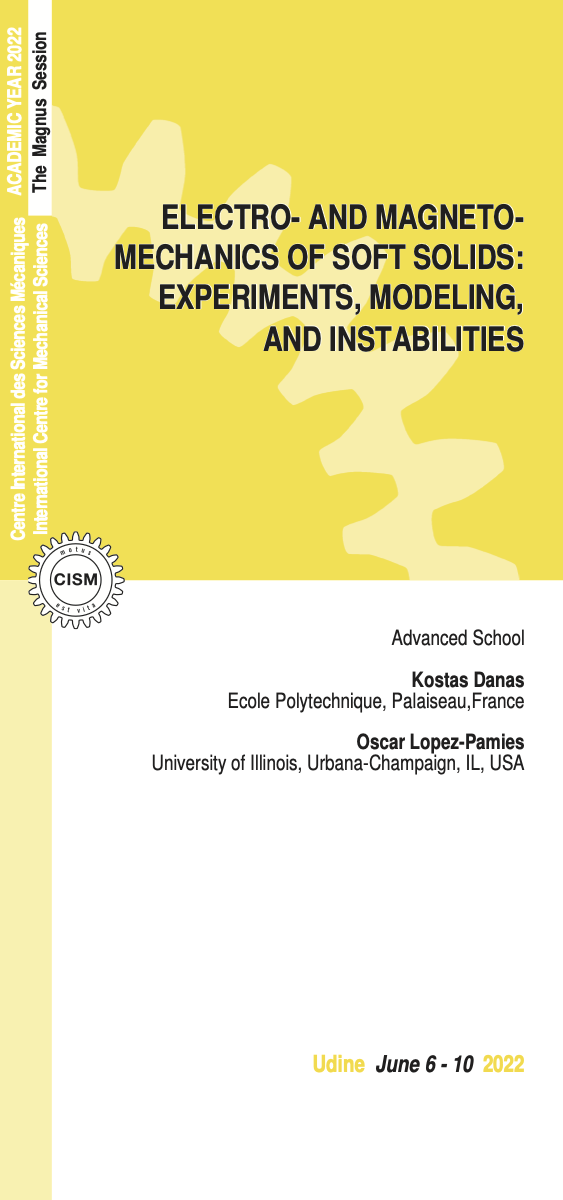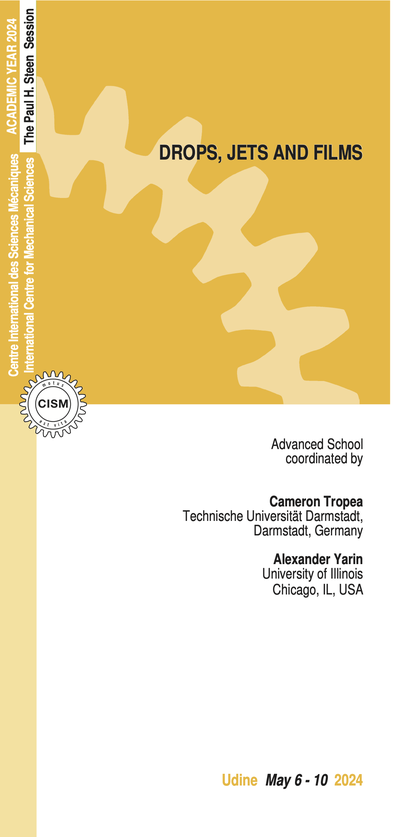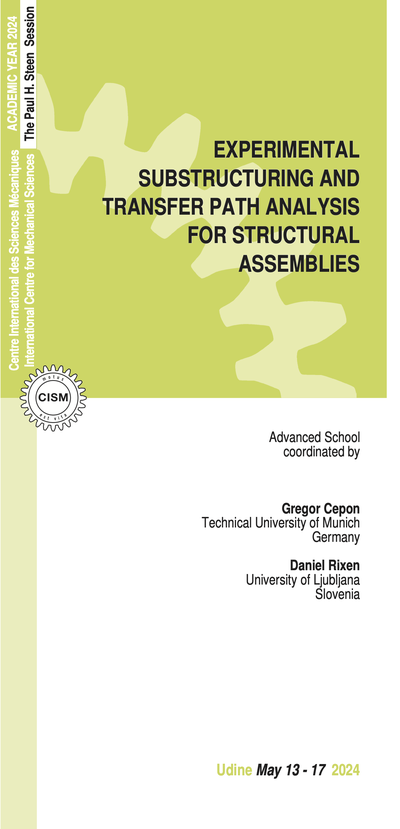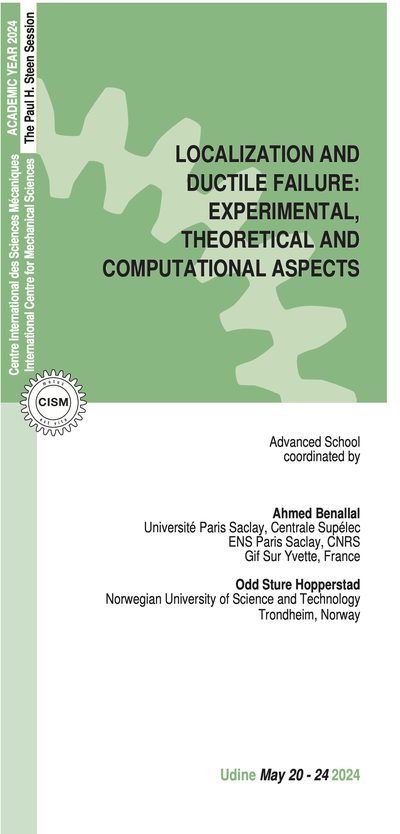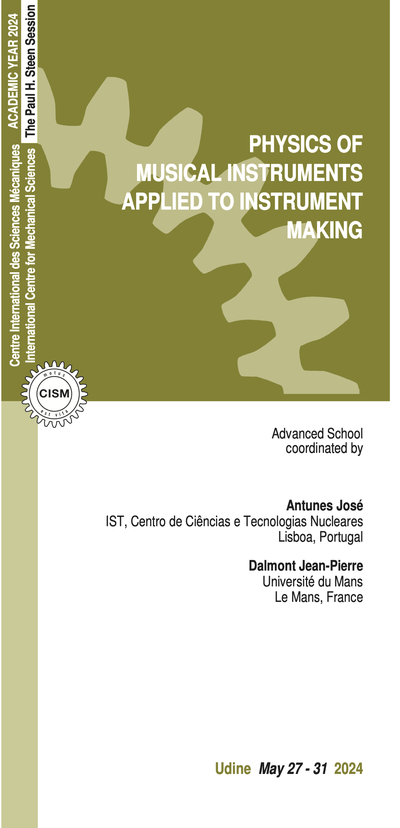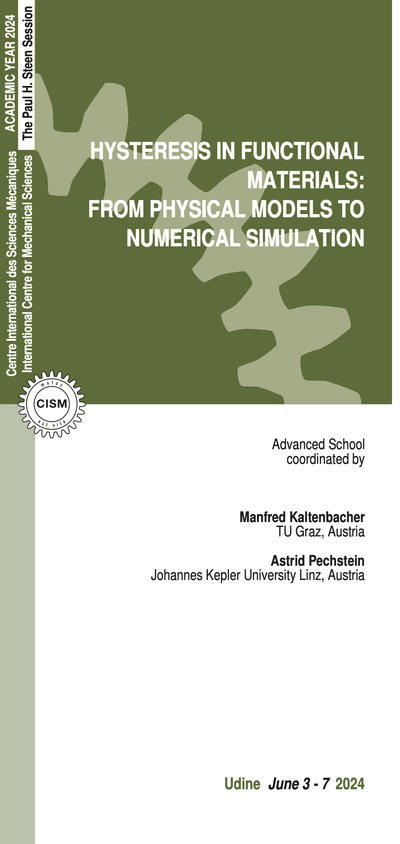Over the last two decades, increasing efforts have been devoted by numerous researchers in a wide range of fields to design new composite materials with enhanced coupled properties. Most of these efforts have focused on soft organic materials because of their potential to undergo large reversible deformations when subjected to a variety of external stimuli, such as electric and magnetic fields, temperature changes and chemical changes. The focus of this course will be on the electro- and magneto- mechanics of soft composite materials and structures. These may comprise hierarchical microstructures and/or micro- architectures spanning several length scales from the nano- to the centi-meter.
The focus of the course will be on magnetorheological elastomers (MREs) and dielectric elastomer composites (DECs), which are composite materials that comprise ferromagnetic and high-dielectric/ conducting filler nano- and micro- particles embedded in a soft polymeric matrix. This gives rise to a coupled magneto- and electro- mechanical response at the macroscopic (order of millimeters and larger) scale when they are subjected to magneto- electro- mechanical external stimuli. While such MRE and DEC materials and devices can become unstable at some critical electro-magneto- mechanical loading, their response may be well controlled in the post-instability regime. This feature motivates the operation of these devices in this unstable region to obtain controlled pattern formation, soft robotic motion and artificial muscles, controllable band-gap acoustic and electromagnetic properties, energy harvesting as well as actively controlled stiffness (for cell-growth).
The topics of this Advanced School will include the presentation of experimental fabrication and testing techniques for MREs and DECs, the derivation of thermodynamically-consistent coupled variational formulations, the numerical implementation and analysis of MREs and DECs as well as of their stability using homogenization techniques, theoretical coupled homogenization and phenomenological continuum theories. The course will emphasize the significance of an integrated experimental-analytical- numerical approach across the relevant length scales.
The Course will consist of intro-ductory lectures on the theoretical aspects of such materials, followed by lectures on more specialized topics given by eminent experts in the field of experiments, phenomenological and micromechanical modeling of active composites and structures, instabilities and energy harvesting. The course will close with recent examples showing the necessary but also powerful combination of experiments, numerics and theory to study the response of MREs and DECs and their instabilities.
The School is addressed to doctoral students, post-docs and early career researchers with interest in active soft materials. The course is designed to give an integrated experimental, numerical and theoretical viewpoint on such novel material systems as well as possible future research directions in this field.
6 lectures on: magnetoactive soft solids, phenomenological mode- ling of magneto-elasticity, balance principles (momenta and Max- well), macroscopic and homogenization modeling and experiments of magnetorheological elastomers (MREs), including instabilities on MRE film/substrate systems, modeling of magnetic hysteresis and h-MREs.
6 lectures on: analytical methods for studying periodic and localized buckling patterns, and explain how the methods can be used to study the wrinkling and necking of dielelectric thin sheets under general electromechanical loading conditions.
6 lectures on: the phenomenological and micromechanical modeling and stability of dielectric elastomers and dielectric elastomer composites (DECs). He will also present an analysis of the features of different types of devices made up of dielectric elastomers: actuators and mechanical-to-electrical energy converters for energy harvesting purposes.
6 lectures on: the continuum-mechanical modeling and numerical simulation of magneto-electro-mechanically coupled boundary value problems across length scales, first-order computational homog- enization strategies, material and structural stability analysis, and phase-field modeling of microstructures at finite deformations.
6 lectures on: on fundamentals of electro-magneto-elasticity, homogenization of electro-magneto-elastic composites at small and finite deformations, analytical and numerical methods for homog- enization in MREs and DECs (with and without space charges), comparisons between homogenization-based theoretical results and experiments.
4 lectures on: the state-of-the-art fabrication, experiments and theoretical study of hard-MRE structures, effect of geometry and direction of the applied magnetic fields upon the hMRE response, beam, shell and plate theories for hMREs.
The course is offered in a hybrid format giving the possibility to attend the course also by remote (on Microsoft Teams platform). On-site places are limited and assigned on first come first served basis.
The registration fees are:
- On-site participation, 600.00 Euro + VAT* * where applicable (bank charges are not included) Italian VAT is 22%.
This fee includes a complimentary bag, five fixed menu buffet lunches, hot beverages, downloadable lecture notes.
Deadline for on-site application is May 6, 2022.
- Online participation, 250.00 Euro + VAT* * where applicable (bank charges are not included) Italian VAT is 22%.
This fee includes downloadable lecture notes.
Deadline for online application is May 25, 2022.
Application forms should be sent on-line through CISM website
A message of confirmation will be sent to accepted participants.
Upon request a limited number of on-site participants can be accommodated at CISM Guest House at the price of 30 Euro per person/night (mail to: foresteria@cism.it).
CANCELLATION POLICY
Applicants may cancel their registration and receive a full refund by notifying CISM Secretariat in writing (by email) no later than:
- May 6, 2022 for on-site participants (no refund after the deadline);
- May 25, 2022 for online participants (no refund after the deadline).
Cancellation requests received after these deadlines will be charged a 50.00 Euro handling fee. Incorrect payments are subject to Euro 50,00 handling fee.
GRANTS
A limited number of participants from universities and research centres who are not supported by their own institutions can request the waive of the registration fee and/or free lodging.
Requests should be sent to CISM Secretariat by April 6, 2022 along with the applicant's curriculum and a letter of recommendation by the head of the department or a supervisor confirming that the institute cannot provide funding. Preference will be given to applicants from countries that sponsor CISM.
